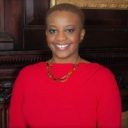If you visit this year’s International Women’s Day website, which I encourage everyone to do, you will be prompted to make a pledge to #PressforProgress. The 2018 theme recognizes the gains women have made, while also acknowledging the progress still needed to reach true gender parity. As I think about the one way (and there are many) I would like to see philanthropy live this year’s theme, it is simple: apply an intersectional lens to our women and girls work.
I will forever remember my first experience at the intersection of race and gender.
I was in the third grade riding the bus home from school and, as was the case oftentimes throughout my education, I was the only African American student there.
As normal playful pestering between students escalated to age-appropriate name-calling, I was anticipating a ‘you are ugly’ or ‘you are so stupid’ to fly my way.
But I was none of those things the other kids were.
There was a special name for me. One of the boys called me a ‘Black Bitch.’
At age eight, I had no idea what those words meant – and I am pretty sure the name-caller didn’t either.
But, I learned that day what I would come to be reminded of again and again. I was not just a girl. I was not just black. I was a black girl…and that would forever set me apart.
It would take a decade, then as college student reading the poet Audre Lorde, to understand, and fully embrace, this duality. Lorde wrote, “I recognize that my power as well as my primary oppressions come as a result of my blackness as well as my womaness, and therefore my struggles on both of these fronts are inseparable.”
Intersectionality, a term coined by American feminist scholar, critical race theorist and activist, Kimberlé Crenshaw, explains the confluence of one’s varied identities and how those identities, across gender, race, economic status, sexual orientation, ability, language, citizenship status, and more, meet, or intersect, to shape one’s lived experiences and understanding of the broader human condition.
Because these identities are inextricably interwoven, any attempt to look at them in isolation, as our grantmaking strategies often do, is a failed one. It is more than a theory on identity; it is a theory of compounding oppression.
Across the field, foundations have pressed towards gender parity. But while ‘women and girls’ strategies abound, few are as intersectional as they could be. Here’s what we can do differently:
- De-center Whiteness
Abandon strategies that keep white constructions and expressions of femininity as the standard for others to obtain.These strategies maintain a centrality of whiteness that marginalize and demonize ways of being that women of color embrace. - Reject heteronormativity
Embrace the fact that gender is not solely classified within the male/female binary, that there are no right or wrong ways for women and girls to ‘perform’ their gender and that heterosexuality is not the only sexual orientation.Strategies that ascribe femininity solely to girls and masculinity solely to boys maintain narrow patriarchal gender roles and have damaging, and potentially deadly, consequences for those of us in the LGBTQ community. - Step back and follow the field
As foundations, we are often behind where many of our potential partners are.While we are learning, we can invest in people and organizations within our communities, countries and across the world, who are authentically leading on issues of justice and parity. No one has all the answers and humility will take us farther than any strategy ever can. - Trust women of color
Hire us. Fund us. Let us lead. Place us on your boards. Listen.
In the push for gender parity, we must not replicate the very oppressions we are fighting against.
We must not only fight for parity to men; we must also fight for parity among women.
If #TimesUp on sexual harassment, then is it not also up on one-dimensional analyses that maintain age-old oppressions?
Our work must be intersectional and consider the realities and conditions of ALL girls: Brown girls, queer girls, girls in poverty, trans women and more. I don’t want another eight-year-old Black girl spending the next decade learning to love herself.
As you reflect on International Women’s Day, how will your foundation #PressforProgress?
Melanie R. Brown has over a decade of experience in US philanthropy and is Senior Program Officer at the Bill and Melinda Gates Foundation. She is an Atlantic Fellow in Social and Economic Equity at the London School of Economics and is based in Washington, D.C. She most recently wrote Arming for Justice: charge to philanthropy for Alliance magazine.
Click here for more content, written to celebrate International Women’s Day 2018.





Comments (0)